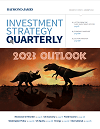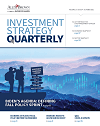“In the wake of COVID-19’s disruption in the U.S., we have seen a more unified effort across the government to increase pressure on China,” says Washington Policy Analyst Ed Mills.
Key Takeaways
- The spread of COVID-19 and the associated economic disruption shifted the dynamics of the relationship between the U.S. and China in a major way.
- The Trump administration’s China “hawks” are now clearly driving the agenda, as evidenced in the recent uptick in administration policies challenging China in an increasingly broad manner.
- A variety of notable actions have come from the White House, Congress, and federal agencies increasing pressure on China in areas such as technology, capital markets, human rights, and supply chain security.
- The economic relationship may prove to be an important area of cooperation for the two sides to continue dialogue and maintain general global economic stability at a fragile time.
The year began with the signing of a “Phase One” economic and trade agreement between the U.S. and China which was set to provide President Trump with a significant win backing up a strong economy heading into his reelection campaign. However, as we have seen in most other areas, the spread of COVID-19 and the associated economic disruption shifted the dynamics of the relationship between the U.S. and China in a major way.
Importantly, the Trump administration’s China ‘hawks’ are now clearly driving the agenda, as evidenced in the recent uptick in administration policies challenging China in an increasingly broad manner. Particularly, U.S./China tensions are notably rising in the areas of technology (next-gen 5G networks and advanced computing) and capital markets, which will be leading themes for the rest of 2020 and beyond. The tensions are also becoming increasingly geopolitical in nature, as we have seen in questions over the future of Hong Kong and Taiwan.
Looking to the future, we will be keeping a close eye on two factors which will play a large role in the U.S./China dynamic in the coming months: the scope and pace of the U.S. economic recovery, and political messaging leading up to the November elections. We expect the election campaign to entrench negative public sentiment against China for the foreseeable future and become a key campaign issue for both President Trump and former Vice President Biden. Furthermore, a faster than anticipated economic recovery along the lines of the bounce back we have seen in the market could embolden President Trump to take more aggressive actions against China, as we have seen throughout the trade fight of 2017-2019. Throughout this, market attention will focus on the threat of the Phase One trade deal collapsing. Although we anticipate escalating tensions could lead to threats to pull out of the deal by either side, the economic relationship may prove to be an important area of cooperation in order for the two sides to maintain dialogue during a fragile global economic recovery.
Pressure on China increasingly bipartisan across the government
In the wake of COVID-19’s disruption in the U.S., we have seen a more unified effort across the government to increase pressure on China. A variety of notable actions have come from the White House, Congress, and federal agencies increasing pressure on China in areas such as technology, capital markets, human rights, and supply chain security. The increased pace of these actions matches the war of words between the two nations which has escalated over China’s role in the global spread of COVID-19.
In our view, the most impactful of these efforts will be limiting access to U.S. technology and software to China’s leading technology companies and increasing scrutiny on China’s access to U.S. capital markets. The tech war dramatically escalated this spring, and the conditions for a longer-term “Tech Cold War” are solidifying, causing the U.S. and China to compete over primacy in the space of next-gen networks and technologies. Pressure is also building on capital market ties between the U.S. and China. The Trump administration successfully pushed back on the government retirement savings fund transitioning part of its portfolio to Chinese equities, and there is a high likelihood of Congress enacting a law that would force Chinese equities to delist from U.S. stock exchanges if they do not meet certain auditing standards. In all, these two pressure points are likely to be long-term trends, regardless of the administration in power following the 2020 elections.
Impact of the 2020 campaign
We are often asked why this bipartisan push against China exists and whether a potential Biden administration would walk back some of the hardline approach of the Trump administration. I always go back to one of the first lessons I learned as a young Capitol Hill staffer – “In politics, when you are explaining, you are losing.” For members of Congress, they have a choice of which team they want to be on: Team China or Team U.S. This is not a difficult political choice, and we see this playing out on Capitol Hill where members only challenge President Trump with proposals to go even further than he has in confronting China.
This dynamic will limit the extent to which there can be an alternative view with regard to the U.S. relationship with China, particularly given the spread of COVID-19. This election is likely to be one where both Republicans and Democrats will have to take a tough line on China and explain how they plan to hold China accountable for the narrative forming around China’s lack of effective information sharing and containment on COVID-19. Further, given that a significant portion of this year’s legislative action has been stifled by the spread of the virus, candidates will lean more on their China policy as a demonstration of actions they’ve taken during their time in office while making their reelection pitch. This is likely to entrench an overall negative view of China for a significant period.
It is also worth noting that an expanded scope of frictions between the two nations, particularly in an election year where rhetoric will be consistently elevated against China, limits opportunities to find off-ramps to de-escalate. This increases the overall risk of miscalculation on critical matters. Although the two sides are appearing to separate out the recent disputes in order to maintain general economic cooperation, the risks are rising of a spiraling confrontation. Alternatively, the economic relationship may prove to be an important area of cooperation for the two sides to continue a dialogue and maintain general global economic stability at a fragile time. Should Biden win the presidency in November, we could see some de-escalation, but far from a complete thaw. We believe a Biden presidency would seek to reestablish traditional post-World War II global alliances that have been impacted by the Trump presidency. Should that occur, walking back on China would likely not be a top priority. However, we could see some relaxation of tariffs as a way to relieve economic pressures and support recovery.
Read the full July 2020
Investment Strategy Quarterly
Read the full July 2020
Investment Strategy Quarterly
All expressions of opinion reflect the judgment of Raymond James, and are subject to change. International investing involves additional risks such as currency fluctuations, differing financial accounting standards, and possible political and economic instability. These risks are greater in emerging markets.
Markets & Investing Members of the Raymond James Investment Strategy Committee share their views on...
Markets & Investing Review the latest Weekly Headings by CIO Larry Adam. Key Takeaways ...
Technology & Innovation Learn about a few simple things you can do to protect your personal information...

